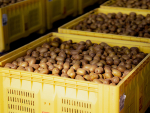This International Women's Day, there are calls to address a reported gender disparity gap between men women New Zealand's horticulture industry leadership.
International Women's Day is celebrated annually on March 8 and honours the achievements of women across all aspects of life - social, economic, cultural, and political - while advocating for gender equality.
Stephanie Wrathall, project manager for Women in Horticulture says that while women make up close to half of the horticulture workforce, they occupy approximately 20% of its leadership positions.
"As we mark International Women's Day, we encourage everyone involved in New Zealand's horticultural sector to question what we can do to encourage more females to pursue high-value leadership roles in horticulture," Wrathall says.
"The time has come to ditch unconscious bias and stereotypes and get more rural women into top leadership positions," she adds.
"It's time to put an emphasis on the value that women can bring to the food and fibre sector and do more to support their place within it."
According to research released in November 2024 by the Food and Fibre Centre of Vocational Excellence, there are 15,200 rural women across New Zealand connected with the food and fibre sector who are mot currently working full-time.
The project considered ways in which future training programmes could be designed to best meet the needs of rural women. It also examined the barriers that are currently preventing women from becoming more involved.
"Many women need to work around school hours or cannot study during busy times of the year such as annual harvest. Living in a rural or isolated community creates other problems around transport and costs."
Women in Horticulture says it believes that flexibility is crucial, both for training and for employment, to help women juggle multiple roles and family commitments while pursuing a horticultural career.
“Women can really enhance the success of our nurseries, orchards, greenhouses, fresh produce farms, export businesses and industry organisations. But we have to make room for them in the workplace and be prepared to make changes to the way we train and operate our businesses. We need to encourage women to put themselves forward – many underestimate the value of the skills they already possess from working part-time or general life experience.”
To access resources, such as pledge cards, to help remind you of how to accelerate action for women in your community, head to https://www.internationalwomensday.com/PledgeCards











